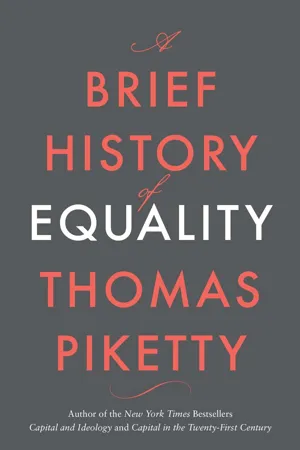
- English
- PDF
- Available on iOS & Android
A Brief History of Equality
About this book
A New York Times Book Review Editors' Choice
A Public Books Best Book of the Year
"A profound and optimistic call to action and reflection. For Piketty, the arc of history is long, but it does bend toward equality. There is nothing automatic about it, however: as citizens, we must be ready to fight for it, and constantly (re)invent the myriad of institutions that will bring it about. This book is here to help."
—Esther Duflo
"A sustained argument for why we should be optimistic about human progress…[Piketty] has laid out a plan that is smart, thoughtful, and motivated by admirable political convictions."
—Gary Gerstle, Washington Post
"Thomas Piketty helped put inequality at the center of political debate. Now, he offers an ambitious program for addressing it…This is political economy on a grand scale, a starting point for debate about the future of progressive politics."
—Michael J. Sandel, author of The Tyranny of Merit
"[Piketty] argues that we're on a trajectory of greater, not less, equality and lays out his prescriptions for remedying our current corrosive wealth disparities."
—David Marchese, New York Times Magazine
It's easy to be pessimistic these days. We know that inequality has increased dramatically over the past two generations. Its ravages are increasingly impossible to ignore. But the grand sweep of history gives us reasons for hope. In this short and surprisingly optimistic history of human progress, the world's leading economist of inequality shows that over the centuries we have been moving, fitfully and inconsistently but inexorably, toward greater equality.
Thomas Piketty guides us through the seismic movements that have made the modern world: the birth of capitalism, the age of revolution, imperialism, slavery, two world wars, and the building of the welfare state. He shows that through it all, societies have moved toward a more just distribution of income and assets, reducing racial and gender inequalities and offering greater access to health care, education, and the rights of citizenship. To keep moving, he argues, we need to commit to legal, social, fiscal, and educational systems that can make equality a lasting reality, while resisting the temptations of cultural separatism. At stake is the quality of life for billions of people. We know we can do better. But do we dare?
Frequently asked questions
- Essential is ideal for learners and professionals who enjoy exploring a wide range of subjects. Access the Essential Library with 800,000+ trusted titles and best-sellers across business, personal growth, and the humanities. Includes unlimited reading time and Standard Read Aloud voice.
- Complete: Perfect for advanced learners and researchers needing full, unrestricted access. Unlock 1.4M+ books across hundreds of subjects, including academic and specialized titles. The Complete Plan also includes advanced features like Premium Read Aloud and Research Assistant.
Please note we cannot support devices running on iOS 13 and Android 7 or earlier. Learn more about using the app.
Information
Table of contents
- Cover
- Title Page
- Copyright
- Contents
- Acknowledgments
- Introduction
- 1. The Movement toward Equality: The First Milestones
- 2. The Slow Deconcentration of Power and Property
- 3. The Heritage of Slavery and Colonialism
- 4. The Question of Reparations
- 5. Revolution, Status, and Class
- 6. The “Great Redistribution”: 1914–1980
- 7. Democracy, Socialism, and Progressive Taxation
- 8. Real Equality against Discrimination
- 9. Exiting Neocolonialism
- 10. Toward a Democratic, Ecological, and Multicultural Socialism
- Contents in Detail
- List of Tables and Illustrations
- Index